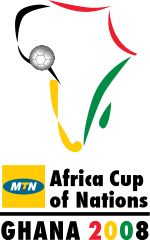2008 Africa Cup of Nations
| MTN Africa Cup of Nations Ghana 2008 | |
|---|---|
|
Africa Cup of Nations 2008 official logo | |
| Tournament details | |
| Host country | Ghana |
| Dates | 20 January – 10 February |
| Teams | 16 (from 1 confederation) |
| Venue(s) | 4 (in 4 host cities) |
| Final positions | |
| Champions |
|
| Runners-up |
|
| Third place |
|
| Fourth place |
|
| Tournament statistics | |
| Matches played | 32 |
| Goals scored | 99 (3.09 per match) |
| Attendance | 714,000 (22,313 per match) |
| Top scorer(s) |
|
| Best player |
|
| Best goalkeeper |
|
The 2008 Africa Cup of Nations, also known as the MTN Africa Cup of Nations due to the competition's sponsorship by MTN, was the 26th edition of the Africa Cup of Nations, the biennial football tournament for nations affiliated to the Confederation of African Football (CAF). The tournament was staged at four venues around Ghana between 20 January and 10 February 2008. Egypt won the tournament, beating Cameroon 1–0 in the final. With 99 goals, it was the highest-scoring Africa Cup of Nations ever.
Background
Ghana won the right to host the tournament after defeating Libya 9–3 in a vote among Confederation of African Football (CAF) executive committee members in Cairo. South Africa withdrew their bid after winning the right to host the 2010 World Cup.
Venues
| Accra | Kumasi | |
|---|---|---|
| Ohene Djan Stadium | Baba Yara Stadium | |
 |  | |
| Capacity: 40,000[1] | Capacity: 40,528 | |
| Tamale | Sekondi-Takoradi | |
| Tamale Stadium | Sekondi-Takoradi Stadium | |
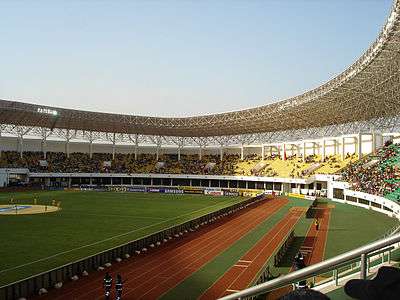 | 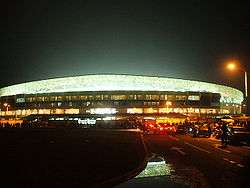 | |
| Capacity: 21,017 | Capacity: 20,088 |
Squads
Qualification
The entrants were divided into 12 groups. All group winners and the best three runners-up from groups with four teams (groups 2-11) qualified for the finals. Host Ghana qualified automatically. Qualifying took place between 2 September 2006 and 13 October 2007.
Teams
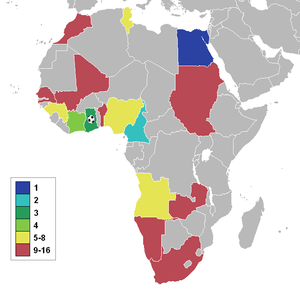
-
 Ghana – Host, 16th appearance (4 titles)
Ghana – Host, 16th appearance (4 titles) -
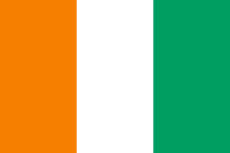 Ivory Coast – Group 1 winner, 17th appearance (1 title)
Ivory Coast – Group 1 winner, 17th appearance (1 title) -
 Egypt – Group 2 winner, 21st appearance (5 titles)
Egypt – Group 2 winner, 21st appearance (5 titles) -
 Nigeria – Group 3 winner, 15th appearance (2 titles)
Nigeria – Group 3 winner, 15th appearance (2 titles) -
 Sudan – Group 4 winner, 7th appearance (1 title)
Sudan – Group 4 winner, 7th appearance (1 title) -
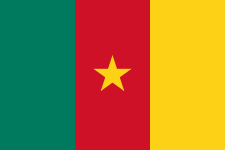 Cameroon – Group 5 winner, 15th appearance (4 titles)
Cameroon – Group 5 winner, 15th appearance (4 titles) -
 Angola – Group 6 winner, 4th appearance
Angola – Group 6 winner, 4th appearance -
 Senegal – Group 7 winner, 11th appearance
Senegal – Group 7 winner, 11th appearance -
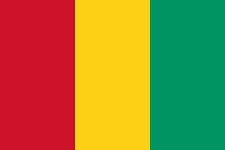 Guinea – Group 8 winner, 9th appearance
Guinea – Group 8 winner, 9th appearance -
 Mali – Group 9 winner, 5th appearance
Mali – Group 9 winner, 5th appearance -
 Namibia – Group 10 winner, 2nd appearance
Namibia – Group 10 winner, 2nd appearance -
 Zambia – Group 11 winner, 13th appearance
Zambia – Group 11 winner, 13th appearance -
 Morocco – Group 12 winner, 13th appearance (1 title)
Morocco – Group 12 winner, 13th appearance (1 title) -
 Tunisia – Group 4 runner-up, 13th appearance (1 title)
Tunisia – Group 4 runner-up, 13th appearance (1 title) -
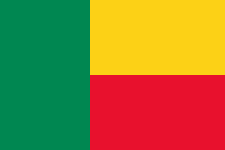 Benin – Group 9 runner-up, 2nd appearance
Benin – Group 9 runner-up, 2nd appearance -
 South Africa – Group 11 runner-up, 7th appearance (1 title)
South Africa – Group 11 runner-up, 7th appearance (1 title)
Match officials
16 referees and 16 assistant referees were selected for the tournament, including two from Japan and one from South Korea.[2]
| Referees | Assistant Referees |
|---|---|
| |
|
| |
|
| |
|
| |
|
| |
|
| |
|
| |
|
| |
|
| |
|
| |
|
| |
|
| |
|
| |
|
| |
|
| |
|
| |
|
Seeding and grouping procedure
The draw for the tournament took place on 19 October 2007. The sixteen teams were divided into four pots according to their performances in past Cup of Nations tournaments. Ghana, as host, were automatically seeded as the top team in Group A. Egypt, the defending champions, were seeded as the top team in Group C.[3] Each group consists of four teams, one drawn from each of the pots.
- Pot 1: Ghana (Group A), Egypt (Group C), Nigeria, Tunisia
- Pot 2: Cameroon, Côte d'Ivoire, Morocco, Senegal
- Pot 3: Guinea, Mali, South Africa, Zambia
- Pot 4: Angola, Benin, Namibia, Sudan
Tournament ball
During the previous editions of the Africa Cup of Nations, the ball used was not a ball especially made for the tournament. As the tournament was held on even years, the same years big tournaments such as the UEFA European Cup of Nations or the FIFA World Cup were held, the official ball for the tournament held this year was used for the African Cup of Nations: the Adidas Roteiro in 2004, or the Adidas Teamgeist in 2006. However, for the 2008 tournament, Adidas made a special ball, clearly different from the Adidas Europass going to be used five months later for the Euro. The ball was named Wawa Aba and was designed to include host nation Ghana’s red, yellow and green. The ball was later used for the other African competitions.
For the Akan culture originating from Western Africa, the name Wawa Aba is a symbol of persistence. People there particularly believe in the strength and team spirit of a community. The Wawa Aba is the seed of the Wawa tree, one of the strongest and most processible woods of Africa. For the population, the Wawa Aba mainly has mystical significance. These are people who don’t let failure discourage them, who seize all opportunities successfully and who are thus just as strong and adaptable as the Wawa Aba.
Group stage
| Key to colors in group tables |
|---|
| Top two placed teams advanced to the quarter-finals |
Tie-breaking criteria
Where two or more teams end the group stage with the same number of points, their ranking is determined by the following criteria:[4]
- points earned in the matches between the teams concerned;
- goal difference in the matches between the teams concerned;
- number of goals scored in the group matches between the teams concerned;
- number of away goals scored in the matches between the teams concerned;
- goal difference in all group matches;
- number of goals scored in all group matches;
- drawing of lots by the organizing committee.
All times given as local time (UTC+0)
Group A
| Team | Pld | W | D | L | GF | GA | GD | Pts |
|---|---|---|---|---|---|---|---|---|
| |
3 | 3 | 0 | 0 | 5 | 1 | +4 | 9 |
| |
3 | 1 | 1 | 1 | 5 | 5 | 0 | 4 |
| |
3 | 1 | 0 | 2 | 7 | 6 | +1 | 3 |
| |
3 | 0 | 1 | 2 | 2 | 7 | −5 | 1 |
21 January 2008 15:00 |
| Namibia |
1–5 | |
|---|---|---|
| Brendell |
Report | Alloudi Sektioui Zerka |
24 January 2008 17:00 |
| Guinea |
3–2 | |
|---|---|---|
| Feindouno Bangoura |
Report | Aboucherouane Ouaddou |
Group B
| Team | Pld | W | D | L | GF | GA | GD | Pts |
|---|---|---|---|---|---|---|---|---|
| 3 | 3 | 0 | 0 | 8 | 1 | +7 | 9 | |
| |
3 | 1 | 1 | 1 | 2 | 1 | +1 | 4 |
| |
3 | 1 | 1 | 1 | 1 | 3 | −2 | 4 |
| |
3 | 0 | 0 | 3 | 1 | 7 | −6 | 0 |
25 January 2008 17:00 |
| Ivory Coast |
4–1 | |
|---|---|---|
| Drogba Y. Touré Keïta Dindane |
Report | Omotoyossi |
Group C
| Team | Pld | W | D | L | GF | GA | GD | Pts |
|---|---|---|---|---|---|---|---|---|
| |
3 | 2 | 1 | 0 | 8 | 3 | +5 | 7 |
| |
3 | 2 | 0 | 1 | 10 | 5 | +5 | 6 |
| |
3 | 1 | 1 | 1 | 5 | 6 | −1 | 4 |
| |
3 | 0 | 0 | 3 | 0 | 9 | −9 | 0 |
22 January 2008 17:00 |
| Egypt |
4–2 | |
|---|---|---|
| Hosny Zidan |
Report | Eto'o |
26 January 2008 17:00 |
| Cameroon |
5–1 | |
|---|---|---|
| Geremi Job Emana Eto'o |
Report | C. Katongo |
Group D
| Team | Pld | W | D | L | GF | GA | GD | Pts |
|---|---|---|---|---|---|---|---|---|
| |
3 | 1 | 2 | 0 | 5 | 3 | +2 | 5 |
| |
3 | 1 | 2 | 0 | 4 | 2 | +2 | 5 |
| |
3 | 0 | 2 | 1 | 4 | 6 | −2 | 2 |
| |
3 | 0 | 2 | 1 | 3 | 5 | −2 | 2 |
Knockout stage
| Quarter-finals | Semi-finals | Final | ||||||||
| 3 February - Accra | ||||||||||
| |
2 | |||||||||
| 7 February - Accra | ||||||||||
| |
1 | |||||||||
| |
0 | |||||||||
| 4 February - Tamale | ||||||||||
| |
1 | |||||||||
| |
2 | |||||||||
| 10 February - Accra | ||||||||||
| |
3 | |||||||||
| |
0 | |||||||||
| 3 February - Sekondi | ||||||||||
| |
1 | |||||||||
| |
5 | |||||||||
| 7 February - Kumasi | ||||||||||
| |
0 | |||||||||
| |
1 | Third place | ||||||||
| 4 February - Kumasi | ||||||||||
| |
4 | |||||||||
| |
2 | |
4 | |||||||
| |
1 | |
2 | |||||||
| 9 February - Kumasi | ||||||||||
Quarter-finals
4 February 2008 20:30 |
| Tunisia |
2–3 (a.e.t.) |
|
|---|---|---|
| Ben Saada Chikhaoui |
Report | Mbia Geremi |
Semi-finals
Third place match
9 February 2008 17:00 |
| Ghana |
4–2 | |
|---|---|---|
| Muntari Owusu-Abeyie Agogo Dramani |
Report | Sanogo |
Final
Winners
| 2008 Africa Cup of Nations Winners |
|---|
Egypt Sixth title |
Awards
Player of the tournament |
Top scorer
|
Best Goalkeeper
Best XI
The following players were selected as the best in their respective positions, based on their performances throughout the tournament. Their performances were analysed by the tournament's Technical Study Group (TSG), who picked the team.[7]
| Goalkeepers | Defenders | Midfielders | Forwards |
|---|---|---|---|
|
|
- Substitutes
Scorers
|
|
|
References
- ↑ "Ohene Djan Stadium will last "forever"- Micheletti". ghananewsagency.org. Retrieved 4 December 2013.
- ↑ Referees
- ↑ Caf release Cup of Nations' seeds, "BBC Sport", 18 October 2007. Accessed 4 February 2008.
- ↑ Article 5, paragraph 13 in the Regulations of the XXVth Africa Cup of Nations guide.
- ↑ Kick-off delayed by 15 minutes due to floodlight failure
- ↑ "Abd Rabou wins best player award". BBC Sport. 10 February 2008. Retrieved 11 February 2008.
- ↑ "CAF names Best XI for Ghana 2008 ACN". cafonline.com. 10 February 2008. Retrieved 11 February 2008.
External links
| Wikinews has related news: Egypt wins 2008 Africa Cup of Nations |
![]() Media related to 2008 Africa Cup of Nations at Wikimedia Commons
Media related to 2008 Africa Cup of Nations at Wikimedia Commons
- 2008 African Cup of Nations at CAFonline.com
- Africa Cup of Nations on BBC 1Xtra
- African Cup of Nations 2008 coverage on Reuters.co.uk
| ||||||||||||||||||||||||||||||
| ||||||||||||||||||||||||||
